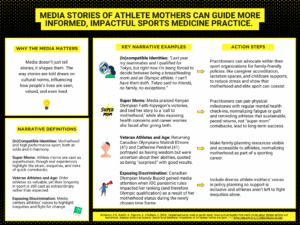When three-time Olympic champion and mother Faith Kipyegon set out to become the first woman to break the four-minute mile, she noted it was about more than just a time barrier:
With Nike backing the campaign, Kipyegon’s pursuit challenges the assumption that elite performance ends with motherhood. Researchers in sports medicine (e.g., Titova et al., 2024) and socio-cultural studies (e.g., McGannon et al., 2024) have shown that motherhood does not end a sports career.
Kipyegon’s recent media attention offers an opportunity to examine what these stories tell us, how media stories can reinforce and/or resist narratives, and their potential clinical value for sport.
Our Study
Our novel study used narrative inquiry theory to examine how media stories portray post-partum ‘comebacks’ for Olympic athlete mothers surrounding Tokyo 2020 and Paris 2024.
Narratives shape the content and meanings of stories through socio-cultural norms, which have consequences for people’s lives. Stories sensationalizing athlete mothers’ ‘comebacks’ often render success as a ‘shock’ by drawing on a ‘body decline’ narrative that associates motherhood with weakness due to physical changes. Recognizing dominant narratives helps sport science practitioners offer informed support and challenge outdated assumptions, by using new/different narratives.
What did we find and why does it matter?
We identified four recurring media narratives in our study:
- (In)compatible identities: Comeback stories reveal structural (e.g., few maternity policies) and cultural (e.g., women do childcare on their own) barriers that pressure sportswomen to choose between motherhood and sport. This narrative impacts mental health (e.g.,stress, guilt). Yet, these stories also highlight how motherhood offers renewed purpose and a more holistic perspective on sport.
-
Clinical Significance: Practitioners can facilitate mental health support(s) to address the emotional toll of post-partum return to sport. Realistic stories of sportswomen and successful post-partum return(s) can be shared in ‘narratives of potential’ and ‘athlete mother compatibility’.
-
- Super mums: Stories portray athletes as returning to peak performance and caregiving without social/structural support. This theme also shows stories exposing difficulties of quick comebacks (e.g., injury, burnout, postpartum complications).
-
-
Clinical Significance: Avoid glorifying seamless returns and provide realistic, available clinical guidelines for return to sport. Practitioners can support realistic goals around post-partum return to sport, and be wary of cultural expectations to “do it all” athletes may internalize.
-
-
Veteran status and age: Athletes delay motherhood during sport careers, plan around competitions, and face uncertainty when returning. Sport culture’s emphasis on youth can also impact post-partum self-confidence and performance.
-
Clinical Significance: Older athlete’ mother may delay motherhood due to an inequitable sport system lagging in family planning/motherhood information and support. Practitioners can offer evidence-based guidance for family planning and individualized support to shift narratives that ‘rebuild confidence and performance’.
-
-
Exposing discrimination: Some athlete mothers use the media to expose inequities, leading to policy changes. These stories position athlete mothers as agents of change.
-
Clinical Significance: Cis-gender, heterosexual and non-disabled athlete mothers’ stories are often emphasized in media narratives. 2SLGBTQ+ athletes, racialized mothers, and those with disabilities can be overlooked. Practitioners can advocate for more inclusive motherhood and ensure athlete mothers are not burdened by advocacy. Sportswomen are advocating for maternity/parental rights because these are still lacking.
-
Take Home Messages
-
Media narratives shape perceptions and actions, related to what athlete mothers are capable of.
-
‘Comeback stories’ offer insights into inequities athlete mothers face, and what social and structural support is needed.
-
Practitioners can facilitate equitable, athlete-centred care to challenge outdated norms to support realistic sport and family goals.

Authors and affiliations:
Jill Moffatt, OLY and Kerry R. McGannon, PhD
Faculty of Kinesiology and Health Sciences
Laurentian University, Sudbury, Ontario
Canada
Funding Statement:
This work was supported by an Insight Grant from the Social Sciences and Humanities Research Council of Canada – 435-2021-0033
References
-
Baker, K. (2025) In appreciation of Faith Kipyegon and Daring to Dream: What it was like witnessing Breaking4 in-person and getting to speak with Faith Kipyegon about it. Citius Mag. https://citiusmag.substack.com/p/in-appreciation-of-faith-kipyegon-and-daring-to-dream
-
McGannon, K.R., Hladun, W., Kulkarni, S., Bundon, A., & Pegoraro, A. (2024). From birth to rebirth: Comeback meanings in media stories of Canadian athlete mothers’ sporting journeys. Sport, Education and Society, 1–14. https://doi.org/10.1080/13573322.2024.2376249.
-
McGannon, K.R., Bundon, A., Pegoraro, A., & Kulkarni, S. (2024). Tangled and bumpy roads to gender equity: Socio-cultural insights from media stories about Olympic athletes and motherhood. American Behavioral Scientist: Special Issue Behavioral Perspectives of the Olympic Games and Sport, 1-17. https://doi.org/10.1177/00027642241261260
- Titova, J., Davenport, M.H., Humphrys, A., & Hayman, M. (2025) Barriers and enablers encountered by elite athletes during preconception and pregnancy: a mixed-methods systematic review. British Journal of Sports Medicine, 59,798-814. https://doi.org/10.1136/bjsports-2024-108380